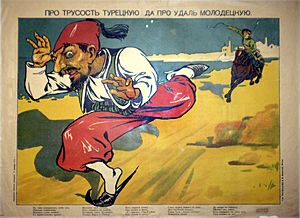Anti-Turkism facts for kids
Anti-Turkism or Turkophobia describes being unfair or prejudiced against Turkish people. It can also mean having negative feelings towards other groups who are related to Turks, known as Turkic peoples.
This term covers unfair treatment not just against Turks from Turkey, but also against other Turkic groups. These include people like Azerbaijanis, Crimean Tatars, and Turkmens. It can also apply to groups who were influenced by Turkish culture, especially during the time of the Ottoman Empire. This includes people like Albanians and Bosniaks in the Balkans. Sometimes, it refers to unfair treatment of Turkish people living in other countries around the world.
Historically, some groups who have had conflicts with Turkic people include Greeks, Armenians, Kurds, and Serbians. These conflicts often arose from historical events and political disagreements.
Contents
What is Anti-Turkism?
Anti-Turkism is a type of prejudice. It means having negative ideas or feelings about Turkish people. It can also apply to other groups who are part of the larger Turkic family. This includes many different cultures and languages.
Who are Turkic Peoples?
Turkic peoples are a large group of people. They live across many parts of the world. They share similar languages and cultural backgrounds. Examples include Azerbaijanis, who live in Azerbaijan, and Turkmens, found in Turkmenistan. Crimean Tatars are another Turkic group. They live in the Crimea region.
How Does it Affect People?
When people have anti-Turkic views, it can lead to unfair treatment. This might happen in daily life. It can also affect Turkish people who live outside of Turkey. This is especially true for those who are part of the Turkish diaspora. The diaspora refers to people who have moved from their home country to live in other places.
Historical Background
Throughout history, different groups have had conflicts. These conflicts sometimes led to negative feelings between peoples. For example, there have been historical tensions between some Turkic groups and their neighbors. These neighbors include Greeks, Armenians, Kurds, and Serbians.
Understanding Past Conflicts
Many historical events have shaped these relationships. These events often involved wars or political struggles. It is important to remember that history is complex. Different groups have different views on past events. Understanding these views helps us learn about the world.
See Also
Images for kids
 | William M. Jackson |
 | Juan E. Gilbert |
 | Neil deGrasse Tyson |






